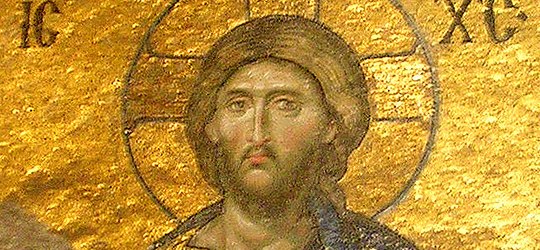
Most historians have concluded that a man named Jesus truly lived and died in first century Palestine, and that the gospels tell us significant details about his life. These historians include non-believers and Jews (who generally believe Jesus was no more than an outstanding man) as well as Christians (who generally believe he was divine).
But this man, who walked the dusty roads of Galilee and was executed by the Roman government which occupied Palestine, was before long believed by many of his followers to be in some senses God, or equal with God.
How did it happen?
Monotheism and Jesus
The Jews were strong monotheists. At the time of Jesus they recognised that God used “principal agents” to carry out his purposes. These included angels, prophets and revered ancestor figures such as Moses or Enoch, and sometimes highly exalted language was used about them. But these agents were never worshiped; worship was given only to the “one true God”.
Jesus lived in this environment. He was greatly respected and revered by many who met him, some even thought he was that great principal agent, the Messiah. But good Jews would have found it very difficult to worship him.
Worship and Jesus
Several Greek words are used to describe people’s reactions to Jesus. Most of them imply great respect and reverence, which may appropriately be given to other humans. One word (proskuneo) is commonly used to describe worship of God and scholars debate the implications of this.
Nevertheless, it seems that however people of his day reverenced Jesus, they did not worship him in the same way they worshiped God.
Early christian devotion to Jesus
But within a short time (possibly a decade) after his death, Jesus’ followers, who were almost all Jews, were worshiping him in a way that no other figure except God was worshiped. This can be seen in several early creed and hymns preserved in the New Testament – for example, in Philippians 2:5-11, where language used to refer to God in Isaiah and the Psalms is used of Jesus.
Examples of this early devotion to Jesus include:
- He was called “Lord” (Greek:kyrios), a word which can simply mean a master, but in some places is probably equivalent to “Adonay”, the Hebrew name of God.
- The early christians prayed to Jesus, and to God in Jesus’ name.
- Baptism was in his name.
- He was the Lord who presided over the community gathered at the common sacred meal.
- Hymns were sung to him.
- His name was “confessed” as part of worship.
This devotion is unprecedented for Jews.
Differences from polytheism
Polytheism was common in the Roman world, and monotheism was rare. The early christians continued the monotheism of the Jews, and continued to see God as the “one true God”. They strongly opposed worship of other gods, and called them false gods or demons (e.g. 1 Corinthians 10:14-22, 1 Thessalonians 1:9-10). Nevertheless, they worshiped Jesus along with God, and believed this was to God’s glory.
Later doctrinal development
Perhaps the early christians were led to include Jesus in their worship as they reflected on his life and resurrection, and possibly due to powerful religious experiences. But it seems that they didn’t at first understand exactly how to explain their belief. But gradually they came to see him as “the Son” who had existed with God before the creation of the world. Centuries later, the full doctrine of the Trinity was formulated.
So how did Jesus become God?
It seems the conclusion was forced on them by reflection on Jesus’ life, teachings, death and resurrection, and their instinct to worship him. Christians can easily believe this was a process which was guided by the Holy Spirit, just as unbelievers will think it had a more natural explanation.
But clearly it wasn’t a later legend, as was part of christian practice from the very early days.
Reference
Material for this post was drawn mostly from Larry Hurtado’s book How on Earth did Jesus Become a God? Hurtado is emeritus professor of New Testament at the University of Edinburgh, and a recognised expert on early christian devotion to Jesus.
See also an extended discussion of whether Jesus was the son of God, on this website.
Photo: Flickr Creative Commons




But clearly it wasn’t a later legend, as was part of christian practice from the very early days.
The evidence clearly refutes this claim.